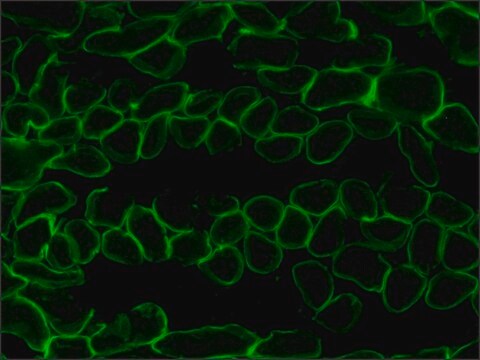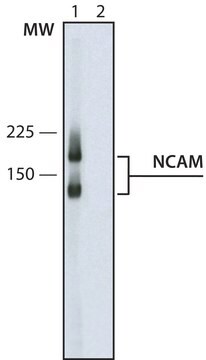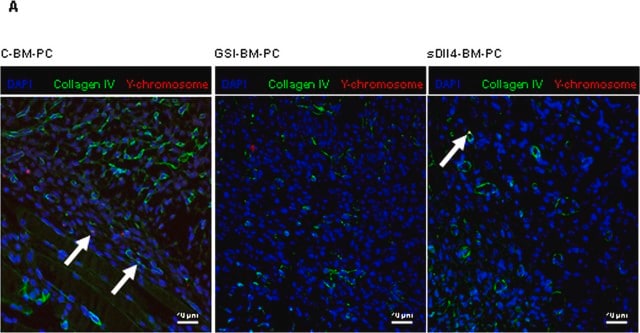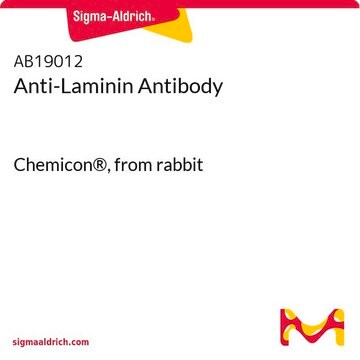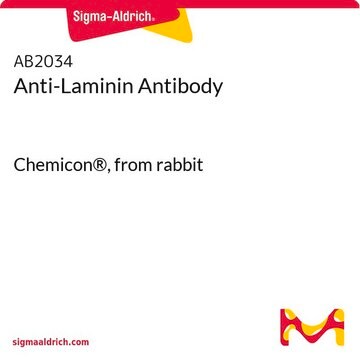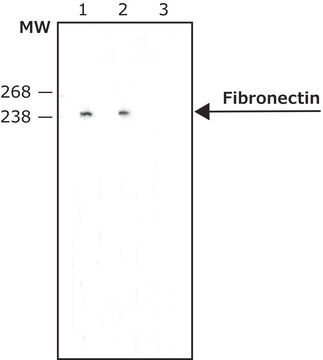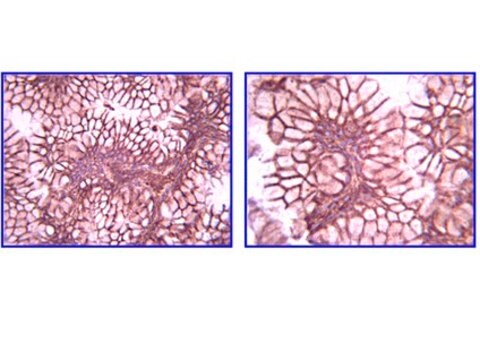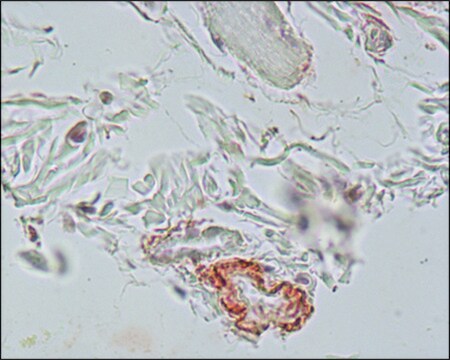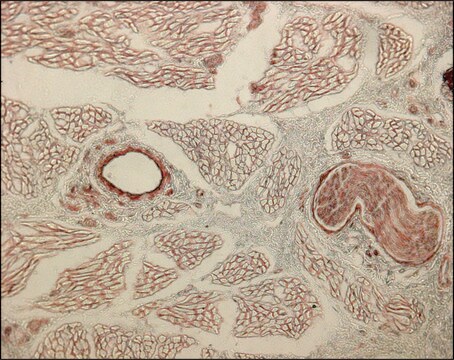추천 제품
제품명
Monoclonal Anti-Laminin antibody produced in mouse, clone LAM-89, ascites fluid
생물학적 소스
mouse
Quality Level
결합
unconjugated
항체 형태
ascites fluid
항체 생산 유형
primary antibodies
클론
LAM-89, monoclonal
포함
15 mM sodium azide
종 반응성
feline, human, pig
반응하면 안 됨
rabbit, lizard, sheep, carp, canine, chicken, rat, guinea pig, goat, frog, snake
기술
immunohistochemistry (formalin-fixed, paraffin-embedded sections): 1:1,000 using enzyme-treated human tissue sections
indirect ELISA: suitable
western blot: suitable
동형
IgG1
배송 상태
dry ice
저장 온도
−20°C
타겟 번역 후 변형
unmodified
유전자 정보
human ... LAMA1(284217) , LAMA2(3908) , LAMB1(3912) , LAMB2(3913)
일반 설명
Laminin, a 900kD (approx.) complex extracellular glycoprotein, is the most abundant structural and biologically active component present in the basement membranes. It is a cell substrate adhesion protein and thus has a crucial role in promoting neurite regeneration and modulating cellular functions like differentiation, cell shape and cell movement. Monoclonal Anti-laminin antibody can be used in immunohistochemistry to classify various disease processes involving basement membranes, to mark blood vessel walls of different species and to determine the origin and classification of human tumours. It can also be used in dot blot assays. Mouse anti- laminin antibody reacts specifically with purified human laminin but not with collagen IV, fibronectin, vitronectin or chondroitin sulfate types A, B, and C.
Monoclonal Anti-Laminin (mouse IgG1 isotype) is derived from the hybridoma produced by the fusion of mouse myeloma cells and splenocytes from an immunized mouse. Laminin, the most abundant structural and biologically active component in basement membranes, is a complex extracellular glycoprotein with an approximate molecular weight of 900 kDa. Laminin is composed of one A chain (400 kDa) one B1 chain (215 kDa) and one B2 chain (205 kDa) all held together by disulfide bonds. Laminin is only found in significant quantities in basement membranes, the thin extracellular matrices that surround epithelial tissue, nerve, fat cells and smooth, striated and cardiac muscle.
면역원
human laminin.
애플리케이션
Monoclonal Anti-Laminin antibody produced in mouse has been used in:
- immunohistochemistry to stain matrix proteins
- double immunofluorescence staining
- indirect immunofluorescence
- immunogold labelling for electron microscopy
Monoclonal Anti-laminin antibody can be used in indirect immunostaining to determine the distribution of laminin. It may also be used for ELISA, Immunofluorescence and western blotting.
생화학적/생리학적 작용
Laminin is a cell substrate adhesion protein and thus has a crucial role in promoting neurite regeneration and modulating cellular functions like differentiation, cell shape and cell movement because it appears to be an important cell substrate adhesion protein. It plays an important role in many aspects of the cell biology. Variations in the expression of this protein have been observed in embryogenesis, organogenesis, post traumatic healing and cancer.
면책조항
Unless otherwise stated in our catalog or other company documentation accompanying the product(s), our products are intended for research use only and are not to be used for any other purpose, which includes but is not limited to, unauthorized commercial uses, in vitro diagnostic uses, ex vivo or in vivo therapeutic uses or any type of consumption or application to humans or animals.
적합한 제품을 찾을 수 없으신가요?
당사의 제품 선택기 도구.을(를) 시도해 보세요.
Storage Class Code
12 - Non Combustible Liquids
WGK
nwg
Flash Point (°F)
Not applicable
Flash Point (°C)
Not applicable
가장 최신 버전 중 하나를 선택하세요:
시험 성적서(COA)
Lot/Batch Number
이미 열람한 고객
A Tezcaner et al.
Journal of biomedical materials research. Part A, 86(1), 170-181 (2007-10-25)
In developed countries the aging population faces increasing risks of blinding retinal diseases, for which there are few effective treatments available. Photoreceptor transplantation represents one approach, but generally results have been disappointing. We hypothesize that micropatterned biodegradable poly(L-lactic acid-co-glycolic acid)/poly(hydroxybutyrate-co-hydroxyvaleric
Laminin-211 in skeletal muscle function
Holmberg J, et al.
Cell adhesion & migration, 7(1), 111-111 (2013)
Andrea Farini et al.
Development (Cambridge, England), 143(4), 658-669 (2016-02-18)
Duchenne muscular dystrophy (DMD) is a progressive neuromuscular disorder characterized by muscle wasting and premature death. The defective gene is dystrophin, a structural protein, absence of which causes membrane fragility and myofiber necrosis. Several lines of evidence showed that in
Bryon R McKay et al.
The Journal of physiology, 588(Pt 17), 3307-3320 (2010-07-14)
In humans, muscle satellite cell (SC) enumeration is an important measurement used to determine the myogenic response to various stimuli. To date, the standard practice for enumeration is immunohistochemistry (IHC) using antibodies against common SC markers (Pax7, NCAM). Flow cytometry
Enhanced expression of matrilysin, collagenase, and stromelysin-1 in gastrointestinal ulcers.
Saarialho-Kere UK, et al.
The American Journal of Pathology, 148(2), 519-519 (1996)
자사의 과학자팀은 생명 과학, 재료 과학, 화학 합성, 크로마토그래피, 분석 및 기타 많은 영역을 포함한 모든 과학 분야에 경험이 있습니다..
고객지원팀으로 연락바랍니다.
